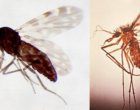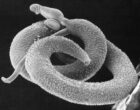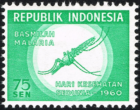Biting midges as vectors of Leishmaniasis? – Insights from Thailand

Leishmaniasis cases are rising in Thailand, with recent evidence suggesting Culicoides biting midges could be potential vectors ofLeishmania parasites to humans… Read more »

Leishmaniasis cases are rising in Thailand, with recent evidence suggesting Culicoides biting midges could be potential vectors ofLeishmania parasites to humans… Read more »

Recent research highlights the value of genomic surveillance in tracking the potential emergence of praziquantel resistance in schistosomes, and provides a… Read more »

Levees along the Yangtze River have significantly impacted the distribution of Oncomelania hupensis, the snail host of Schistosoma japonicum. While the snail's… Read more »

A recent paper sheds light on the historical distribution and genetic diversity of malaria-causing Plasmodium species through ancient DNA analysis from human… Read more »
Modelling predicts how the ecological impacts of climate change are expected to drive changes in the endemic ranges of zoonotic vector-borne diseases globally

While the ‘greening’ of cities offers a promising avenue for enhancing urban resilience to climate change, careful consideration must be given to balance… Read more »

The development of novel, broad-spectrum antihelmintics is a major priority for ensuring the future of effective chemotheraptuic control of parasitic flatworms… Read more »

In Southeast Asia, changes in land-use can increase human and non-human primate interactions, increasing the potential for spillover of zoonotic malaria from… Read more »

Development of a duplex tetra-primer amplification refractory mutation system polymerase chain reaction (T-ARMS-PCR) assay enables the detection of two… Read more »

The development of an effective anti-schistosome vaccine is increasingly considered an essential tool in moving towards schistosomiasis end-game elimination.… Read more »